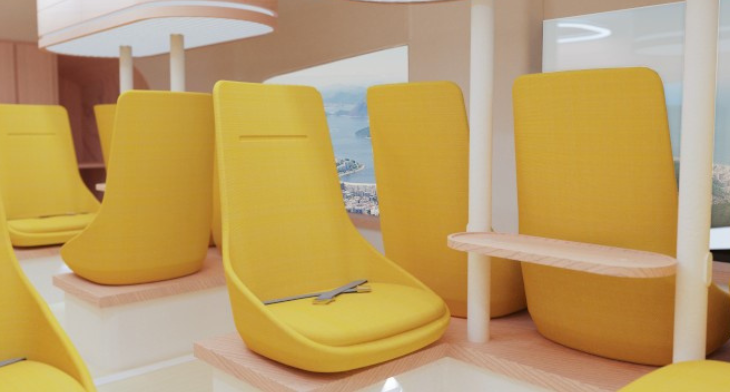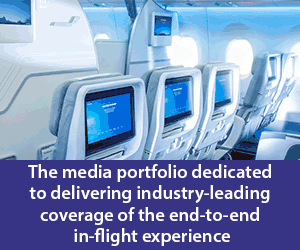
The Crystal Cabin Awards jury of 27 aviation industry experts has selected 24 entries for the final round.
The winners will be announced at a special gala dinner on 14 June 2022 at the Aircraft Interiors Expo in Hamburg. The competition has eight categories, including new cabin concepts, innovative sustainable technologies, next-generation passenger comfort and pioneering safety features.
In the Cabin Concepts category, in co-operation with Finnair, PriestmanGoode and Tangerine, Collins Aerospace submitted one of the year’s most widely discussed entries, AirLounge. This new business class seat developed for Finnair features seating with a contoured shell design providing passengers more living space and freedom to relax in a variety of sitting or sleeping positions with added privacy.
Another entry in this category that provoked wider media interest outside aviation was Teague and NORDAM’s Elevate concept for premium accommodation. Floating furniture is attached to wall braces and combines with inviting materials and contouring to build an organic, homelike space concept that nevertheless allows the same number of seats to be fitted as traditional designs. i4A’s Smart Space 4 Passengers, on the other hand, focusses on maximising comfort options for the economy class.
The Cabin Systems category in 2022 shows how innovation in the cabin can improve air travel in many different ways. The possibility of sudden in-flight cabin decompression means that aircraft must carry large reserves of fuel to comply with ETOPS standards, and Caeli Nova’s new Cordillera emergency oxygen system could save the aviation industry US$500m and 1.2m tonnes of CO₂ annually by opening direct routes over high terrain and increasing the duration that aircraft can fly at high altitudes after a cabin decompression from 22 minutes to over 180 minutes, without any weight or maintenance penalty.
Designed by Airbus Operations GmbH in cooperation with RECARO Aircraft Seating, Flex OLED Kit is a low-weight, wafer-thin HD display that can be placed anywhere in the cabin, including in seatbacks and ceilings for video playback, ambient lighting or to direct passengers through the aircraft.
Seeking to end limitations on flying often experienced by passengers travelling in a powered wheelchair, a consortium comprising Flying Disabled, PriestmanGoode, SWS Certification and Sunrise Medical has designed Air 4 All. The system allows travellers with reduced mobility to slot their wheelchair into a seating space by folding the seat up into the backrest, offering wheelchair users a safe and easy way to travel without being forced to move into a standard cabin seat.
In the Health and Safety category, Safran Cabin’s Fire Resistant Cargo Container adds an additional layer of protection against fire involving lithium batteries. Thanks to its high-temperature resistant panels and unique door materials, Safran’s new device can withstand fire for up to 6 hours, the maximum range an aircraft is permitted to fly from the nearest airport during flight.
Meanwhile, the COVID-19 pandemic has shown the vulnerability of aircraft cabins to air-communicable pathogens. Developed in a cooperation between Pexco Aerospace and Teague, AirShield uses airflow from existing overhead air-vents to create protective air barriers between passengers. Exhaled air is redirected downwards and out of the cabin to the aircraft’s filtration units.
Hypergamut Light by Collins Aerospace is a new cabin lighting system attuned to human biology that helps passengers feel more comfortable during and after their flight. Compatible with human circadian rhythms, the system’s architecture attenuates blue light in a unique way that helps passengers relax even with the lights on and fall asleep faster on long haul flights. Blue light is added back in prior to arrival to help passengers arrive alert, all without affecting the quality or appearance of the light and reducing feelings of jetlag. The system automatically adapts lighting to adjust to the aircraft’s flightpath, time of day, and global positioning.
In the Passenger Comfort category, premium economy seating is one of the industry’s most hotly contested arenas. ZIM Aircraft Seating’s ZIMprivacy seat manages to increase passenger comfort while also prioritising privacy giving more living space and a heightened sense of personal enclosure. The fixed seat back houses a special recline system offering several different body positions. Its fully mechanical assembly is easier to maintain than comparable electrically powered systems.
The accelerating trend to a more personal travel experience is mirrored in Personalized Sound Zone by Jamco Corporation and NTT sonority Inc. Using loudspeakers built into the headrest, PSZ creates a spherical audio area around the passenger’s head where playback is heard by the passenger but is inaudible to others in the cabin. The system achieves this without the need for headphones and audio cables by using wave cancellation to ‘build’ a sound stage around the passenger.
Collins Aerospace’s SpaceChiller offers personal refrigeration for individual passengers or larger parts of the aircraft cabins in a way that was previously not possible using traditional air-cooling technologies. The system provides the luxury of cooled snacks for passengers in a compact device that requires half the power of traditional designs.
When it comes to the IFEC & Digital Services category, Anuvu and Southwest Airlines have designed a new system called Dedicated Space, promising a five-fold increase in available personal bandwidth and a dramatic reduction in latency. Along with faster downloads and uploads, passengers are promised more stable inflight connectivity with the new system.
Thales Avionics and Harman have cooperated to bring end-to-end 4K video quality to aircraft. Optiq is the first QLED IFE display, providing better resolution, colour fidelity and dynamics range, while offering better maintainability for operators.
In another product designed to bring an on-ground media experience into the cabin, ACJ Smart Lifi Monitor puts the customer’s device centre stage by combining a powerful OLED display with mobile processing power. Developed by Airbus Corporate Jets and Latécoère Interconnection Systems, the system pairs with customers’ personal digital devices which can then be used as a remote control. The Smart Lifi Monitor also offers VOD, live television, moving maps, video conferencing and more, making a wider spectrum of digital services and functions available to aircraft passengers.
Material & Components category includes an entry by Thales Avionics: Pulse is a slim, low-weight power supply unit with dynamic power allocation that lets passengers recharge their device on-wing via USB-A, USB-C or wireless charging. Low power anxiety is one of two major concerns addressed by Smart Lock Door, Diehl Aviation’s security device for crew handhelds that allows crew to use digital devices behind a screen mounted in a lockable door to keep tablets safe from theft. Lufthansa Technik’s CabinSHINE maintenance process is designed to make repairing fixtures and furniture up to eight times cheaper and nine times faster than using conventional methods.
The Sustainable Cabin category includes creative submissions that seek to reduce aviation’s ecological footprint. Recycling cabin plastics is an attractive but difficult way to lower ecological footprint and in cooperation with AkzoNobel, Rescoll and Roctool, Swedish manufacturer Diab has pioneered a thermoplastics manufacturing process to produce 100% recyclable panels for cabin interiors.
A co-operation between Lantal Textiles and Olivenleder® have come up with Sustainable Genuine Leather, which uses a tanning process based on vegetable oils instead of chrome- and gasoline-based chemicals, with no compromises on haptic quality.
But materials hidden from passenger view can also have a sizable impact on sustainability, as proved by Lufthansa Technik AG’s AeroFLAX prepreg. Using natural fibres and a bio-based resin system instead of glass fibre, AeroFLAX saves CO₂ not only as a by-product of weight reduction but also during the manufacturing process itself.
The University category is a playing field for imaginative concepts with a clean-sheet approach to a range of issues and situations. Carlos Gatti, student at Wichita State University, has come up with a novel way of accommodating wheelchair passengers. The Fly Your Wheels Suite replaces the front left closet on aircraft like the Boeing 737-800 with a multi-purpose module that can function as a safe parking berth for a wheelchair user during a flight. Rather than taking away existing seating, the idea would let airlines add one paying passenger – the wheelchair user.
Jiayi Yu from the University of Reutlingen designed the Shift Cabin Interior, a study that allows operators to configure seats in multiple positions for work or relaxation, both along the axis of the seat as well as to the side. Aside from the advantage of flexibility, the concept lets airlines fit more seats into the same business class space.
Ken Kirtland of the Georgia Institute of Technology has high aims with Portal: to create an electric short-haul airline based around an innovative aircraft that emphasises a calmer flight experience at slower speeds and fantastic views.





